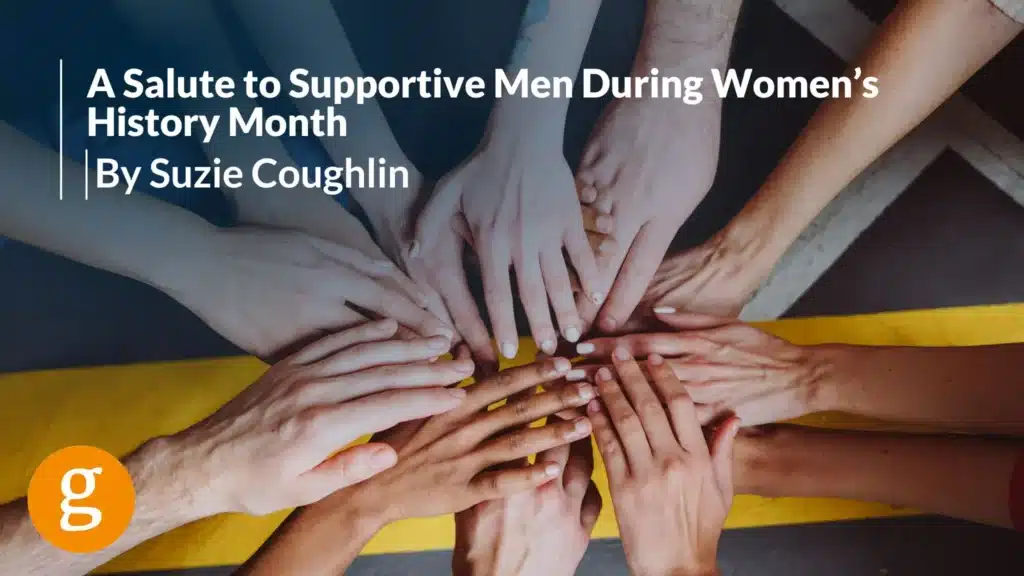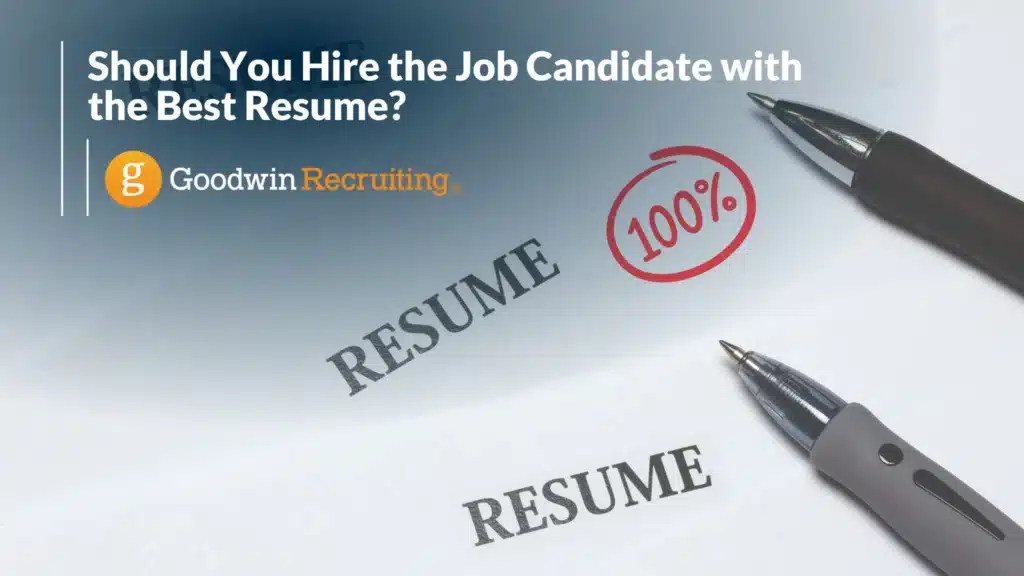This Women’s History Month, Let’s All Help to Move the Mark
Goodwin Recruiting | Diversity & Inclusion, Hiring Advice, Opinion, Recruiting Career Advice | March 23, 2023

Women’s History Month is a time to recognize the extraordinary accomplishments of women throughout American history and the labor movement. It is a time to celebrate our nation of heroes and all that women have contributed to society, here and abroad. Just as important, it is a time to join in and act to create a future where everyone is treated equally.
As we reflect on our past and present, we find there are still many differences today in the ways women are treated, regarded, and referred to (or not!) in our society. Continued gender inequality is why we’re doing something different this Women’s History Month, by sharing solution-based tips for how each of us can help to combat these disparities in the real world and honor the ongoing aspirations and achievements of women.
Here are four solutions we can adopt to effect meaningful change.
1. Challenge ourselves to use gender-neutral words in everyday life
In our business and personal lives, there are many terms that, if used in place of others, will give more people the recognition they deserve and make them feel included and respected. Here are just a few examples…
Instead of this — say this…
Fireman — Firefighter
Policeman — Police Officer
Waiter or Waitress — Server
Weatherman — Meteorologist
Mailman — Mail Carrier or Postal Worker
Chairman — Chairperson
Spokesman — Spokesperson
Salesman — Sales Representative
Mankind — Humankind
2. Use gender-neutral wording in job postings
In today’s tight hiring market, we can’t think of any organization that can afford to alienate top talent when there is an important role to fill. Yet that’s what happens when job postings use words that appeal to or resonate more with one gender, specifically male or female, and that are historically based on stereotypes. Intentionally or not, this happens a lot. Most job postings are not gender-neutral!
There are numerous word choices, some blatant, some subtle, that can be construed by job seekers as gender coded. Some of the terms might surprise you. For example, how often do we see words like competitive, aggressive, or workmanship in a job ad? Such descriptors, when seen by women, can be interpreted as having a bias toward men. And words like patient, interpersonal, and loyal appeal more to women than men. The result is that words can and do deter people from applying for jobs and create gender inequality in the workforce.
How do we ‘rewrite’ our approach to job listings? Glassdoor offers 10 Ways to Remove Gender Bias from Job Descriptions:
- Avoid words like hacker, rockstar, guru, and ninja. Instead, use actual titles, which are gender-neutral, such as engineer, project manager, or developer.
- Check pronouns: As product manager, you (or s/he) will be responsible for setting the product vision and strategy.
- Use a tool like Textio or the free Gender Decoder to identify problem spots in your word choices.
- Avoid superlatives, such as expert, superior, and world class, which can turn off female candidates who are more collaborative than competitive in nature.
- Limit your requirements: Identify requirements that are nice-to-have versus must-have, and then eliminate the nice-to-haves. Research shows that women are unlikely to apply for a position unless they meet 100% of the requirements, while men will apply if they meet 60 percent of the requirements.
- Reconsider college major requirements. Glassdoor research found that the choice of college major can vary by gender, and you may be limiting your candidate pool by requiring a specific degree.
- Express your organization’s commitment to equality and diversity in job ads. Let candidates know you intend to make the workplace a friendly one for them.
- Infuse your organization’s values into your job ads.
- Let candidates know if your company offers volunteer opportunities with organizations like Girls Who Code, or female-friendly employee resource groups, or a mentorship program.
- State family-friendly company benefits in your job listings, such as parental leave, flextime, childcare subsidies, or other benefits that appeal to all candidates.
3. Expand who is considered to be a qualified job candidate
As mentioned above, women only apply for jobs where they believe they’re a 100% match based on requirements listed in a job posting, while men will apply if they meet only 60% of the requirements. This is the case across female demographics among American women and female U.S. citizens, including African American and Black women, as well as White, Hispanic, Asian, and those of other ethnicities.
Knowing this, if you relax some of the parameters in your job postings, you may greatly minimize gender inequality among applicants and find higher application rates and a wider mix of candidates from which to choose, many of whom will be fully qualified for your position.
For example, split out some of your desired qualifications from ‘required’ to ‘preferred but not mandatory’ or ‘experience with XYZ is a plus but not required.’ Also as mentioned above, limit your requirements if and where you can.
4. Offer pay equity and transparency
As recently shared by Raghu Gollamudi, CEO and co-founder of Included and member of the Forbes Human Resources Council, pay equity needs to be addressed now, citing that “The Equal Pay Act, passed in 1963, prohibits employers from paying employees of different sexes less for the same work. While this law has now been in place for 60 years, pay disparities persist, with women and people of color often earning less than their white male counterparts.”
The U.S. Census Bureau’s most recent analysis of the gender pay gap reveals that in 2021, full-time, year-round working women earned 84% of what their male counterparts earned, on average. In general, progress has been slow on this front since the civil rights movement and the interventions of Congress.
Yet despite this persistent and longstanding reality across nearly all occupations, equal pay and pay transparency are gaining in popularity among job applicants and employers alike. The trends are helping to combat pay differences between women and men who perform the same jobs, and this need is especially top of mind during Women’s History Month.
Companies are changing because it’s the right thing to do: Providers of equal pay and those that promote gender equality to elevate the important contributions of women are actively making a difference. A survey by WorldatWork and Fidelity Investments released in January 2023 reveals that nearly 70% of the 534 responding organizations reported taking action on pay equity in 2022, up 4% from 2021 and 1% since 2019.
The co-founder of a compensation management software firm recently told HR Dive that, “Employers leading the charge are rebranding themselves through pay transparency from the top down. They’re doing this by implementing procedures to ensure pay parity, such as with measures that ensure workers are paid fairly for performing the same job, taking factors like geography and performance into account.”
2023 points to necessity: According to Gollamudi, “Pay equity is one of the most critical issues for organizations to address in 2023. I know not all companies have the resources and budget to make compensation adjustments overnight. But you can use data and insights to build a strategy, create a timeline for pay equity, and communicate this to employees and the public. Not only is it the right thing to do, but it also positively affects talent retention, employer brand, and financial performance.”
Keep the playing field open – and level
Each one of us can help move the needle on gender equality in our personal and professional lives, especially during Women’s History Month. At Goodwin Recruiting, we make every effort to ensure hiring employers and job candidates know we’re committed to diversity, equity, and inclusion (DEI) as one of our company’s core values. We uphold it as a company and our expert recruiters do so as individuals.
Reach out to us when you need top talent or your next career opportunity. Our goal is to make a mark during Women’s History Month, on International Women’s Day, during Women’s History Week – and all year long.
Share This Article






































